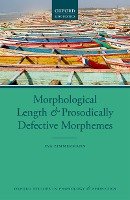This book investigates the phenomenon of morphological length manipulation: changes in segmental length that cannot be explained by phonological means alone but crucially rely on morphological information. Eva Zimmermann provides a unified theoretical account of these phenomena by taking into account all possible prosodically defective morpheme representations and their potential effects on the resulting surface structure. Data are drawn from a wide range of the world's languages, including Aymara, Yine, Upriver Halkomelem, Wolof, Hungarian, Tohono O'odham, and Southern Sierra Miwok, providing a through representative database of morphological length manipulation patterns in the languages of the world. The author demonstrates that alternative accounts suffer from significant problems of both under- and over-generation when tested against the full range of attested phenomena. The volume will be of interest to all researchers and graduate students working in theoretical phonology and morphology.

